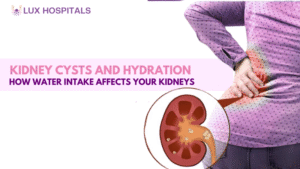The Role of a Urologist in Men’s Health

Men’s health is an essential but neglected aspect. Most men ignore their health until symptoms become severe. Urology deals with the diagnosis, treatment, and prevention of disorders within the male urinary system and genital organs.
The following are the roles played by a urologist in men’s health, common problems encountered, and their available treatments.
Understanding Urology Men’s Health
Urology deals with the urinary tract and the male reproductive system. For men, it covers everything from urinary tract infections to prostate cancer and erectile dysfunction.
The Role of a Urology Doctor
A urologist is a doctor who diagnoses and treats problems such as those involving the kidneys, bladder, prostate, and organs of reproduction. They provide preventive care, medical treatment, and surgery, if necessary.
Common Urological Problems in Men
A number of problems affect the urological health of men. Early diagnosis and treatment are important.
- Benign Prostatic Hyperplasia (BPH): The prostate becomes enlarged, leading to problems during urination. It is treated with medication or minimally invasive procedures.
- Prostate Cancer: Early detection is essential. Urologists perform screening, biopsies, and treatments such as surgery or radiation.
- Erectile Dysfunction (ED): Inability to maintain an erection. Treatment includes medications, counselling, or surgery.
- Kidney Stones: These cause pain and urinary problems. Treated with medication or surgery.
- Urinary Tract Infections (UTIs): Men can also suffer from UTIs, which must be diagnosed and treated.
- Male Infertility: Urologists help in cases of low sperm count with medication, lifestyle changes, or surgery.
Urological Treatments for Men
Urologists offer a variety of treatments for men’s health.
- Medications: The urologist will prescribe medication for BPH, ED, and UTIs to control symptoms.
- Minimally Invasive Procedures: Treatments such as TURP for BPH have quicker recovery times.
- Urology Surgery: Used in more severe cases, such as prostatectomy for cancer.
- Lifestyle Changes: Diet, exercise, and smoking cessation may help control or prevent problems.
- Scheduled Check-ups: Preventive care is necessary in the early detection of urological diseases.
Importance of Urological Care for Men
Regular urological check-ups are essential for overall health. Early intervention could avoid complications such as kidney damage, sexual dysfunction, and a decrease in the quality of life.
When to See a Urology Doctor
Consult a urologist if you have:
- Difficulty initiating urination or changes in urination
- Blood in the urine or semen
- Abdominal, back, or groin pain that does not subside
- Erectile dysfunction or sexual health concerns
- Fertility problems
- Recurrent UTIs
Conclusion
Urology men’s health is a must. Urologists provide the best care for many diseases, enhancing the quality of life through prevention, treatment, and surgery. Regular check-ups are important for effective management and early detection.
If you are having any kind of urological problem, come to the urology department for advanced care.
Frequently Asked Questions
A urologist diagnoses and treats conditions affecting the male urinary system and reproductive organs, including BPH, prostate cancer, erectile dysfunction, kidney stones, and infertility.
Urological problems are health issues related to the urinary system and male reproductive organs, including conditions like BPH, prostate cancer, kidney stones, and erectile dysfunction. These conditions affect urination, sexual health, and fertility.
Yes, urological issues like low sperm count, erectile dysfunction, or prostate problems can affect a man’s fertility. Urologists can help diagnose and treat these conditions to improve fertility.
Men should see a urologist if they experience symptoms like difficulty urinating, blood in urine or semen, persistent abdominal or back pain, erectile dysfunction, fertility issues, or recurrent urinary tract infections.
Lifestyle changes like maintaining a healthy diet, exercising regularly, staying hydrated, quitting smoking, and managing stress can help prevent or manage urological conditions like BPH, kidney stones, and erectile dysfunction, improving overall urological health.




















